Most experts will tell you that one of the most efficient ways of educating young children is to make learning fun.
Since almost every kid nowadays enjoys gaming, one of the most popular approaches is to encourage them to play educational games that can help them further their learning.
There are quite a few options out there, given what a booming industry gaming is. Below, we’ve listed 60 different games on various platforms that will educate your kids as they play.
Quick Links
- Online Web Games
- Pbs Kids (Free)
- Arcademics (Free)
- Learning Games for Kids (Free)
- National Geographic Kids (Free)
- British Council Games (Free)
- Primary Games (Free)
- Sesame Street (Free)
- Funbrain (Free)
- Cookie (Free)
- Nobel Prize Educational Games (Free)
- Quick, Draw! (Free)
- Knoword (Free & Paid Options)
- Mr Nussbaum (Free & Paid Options)
- Abcya! (Free & Paid Options)
- Turtle Diary (Free & Paid Options)
- Starfall (Free & Paid Options)
- Sheppard Software (Free & Paid Options)
- Kahoot! (Free & Paid Options)
- Switchzoo (Free & Paid Options)
- Dimensionu (Paid)
- Poptropica (Paid)
- Brainpop (Paid)
- Mobile Apps
- PC & Console Games
- Minecraft: Education Edition
- Epistory – Typing Chronicles
- Oregon Trail
- Crazy Machines
- Portal
- Itzabitza
- Crayon Physics Deluxe
- Zoombinis
- Carmen Sandiego
- Magic School Bus
- Jumpstart
- Reader Rabbit
- Living Books
- Super Solvers
- Nancy Drew
- National Geographic Challenge!
- My Word Coach
- Big Brain Academy
- Metamorphabet
- Scribblenauts
- Smarty Pants
- Final Thoughts
Online Web Games
Pbs Kids (Free)
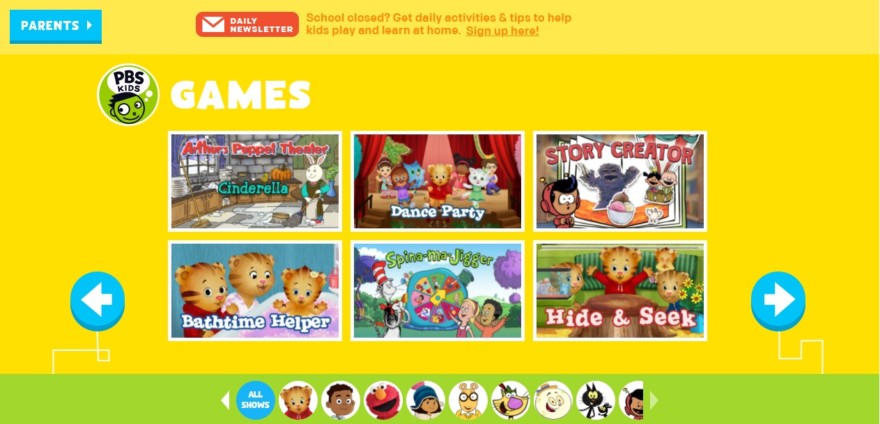
PBS was a major name in US educational television for years, and they’ve brought themselves right into the digital age with the PBS Kids website.
Their site features a wide variety of browser games for children, many of which feature beloved children’s characters form various programs broadcasted on their network.
The games are handily sorted into a variety of topic categories, which range from everything from math and science to music and language.
Arcademics (Free)
As the name implies, Arcademics is a website that presents kids with a wide variety of simple arcade-style games all themed around various basic academic matters – mathematics, spelling, and so forth.
Most games also feature multiplayer, encouraging kids to be competitive in their efforts to learn.
It’s ideal for introducing kids to a subject in a fun way, and the competitive element can be great for spicing up class or group work.
Learning Games for Kids (Free)
A very general site, as its name implies, Learning Games For Kids has a game selection that covers a diverse variety of subjects.
There are simple games here to teach kids everything from language to mathematics, to the names of animals and US states.
The site is laid out in a manner that’s very simple and easy to navigate. It’s a solid introduction to almost any basic school subject.
National Geographic Kids (Free)
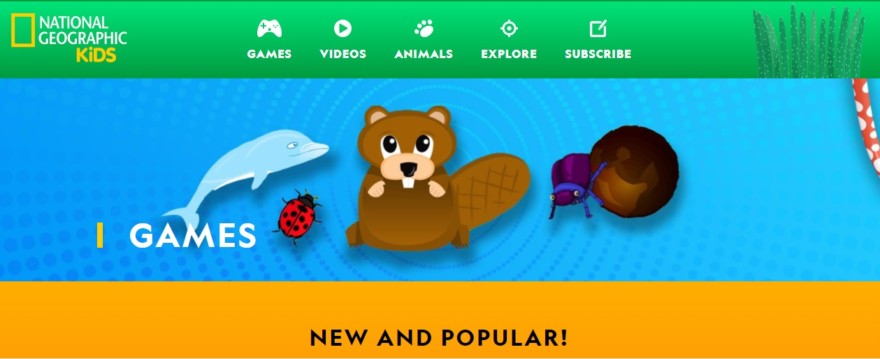
Another effort from National Geographic, and further proof that they really have adapted to the digital age.
The National Geographic Kids website presents kids with a series of simple but fun games, activities, and quizzes about the history and the natural world, encouraging them to grow their knowledge in a simple, fun, and unintimidating way.
It’s also a great avenue for getting them interested in other, more substantial National Geographic media.
British Council Games (Free)
The British Council’s Learn English website, which offers courses and resources to visitors looking to improve their English, also includes a section for kids.
The games here are relatively simple and themed mostly around spelling and definitions, but they’re appealing and fun, and teach through an engaging interface.
Moreover, they’re ideal for both adult second-language speakers of English, and kids who speak it at home and need to learn the basics.
Primary Games (Free)
Boasting over a thousand games, Primary Games offers games that educate kids on everything from maths and science to language and social studies.
What’s more, the site offers a curriculum guide that makes it especially easy to identify which games cover which subjects and what grades and learning levels they cater to.
This, needless to say, is pretty invaluable for teachers and parents and can make the site a great classroom tool.
Sesame Street (Free)
Sesame Street is one of those things that’s endured through the childhood of many generations, and its website brings it to the digital age.
Here, kids can find various simple games, teaching them spelling, animal facts, and whatnot, all with a Sesame Street theme.
It’ll be especially effective if the kids have grown up watching Sesame Street since they’ll have the subject matter presented to them by characters they love.
Funbrain (Free)
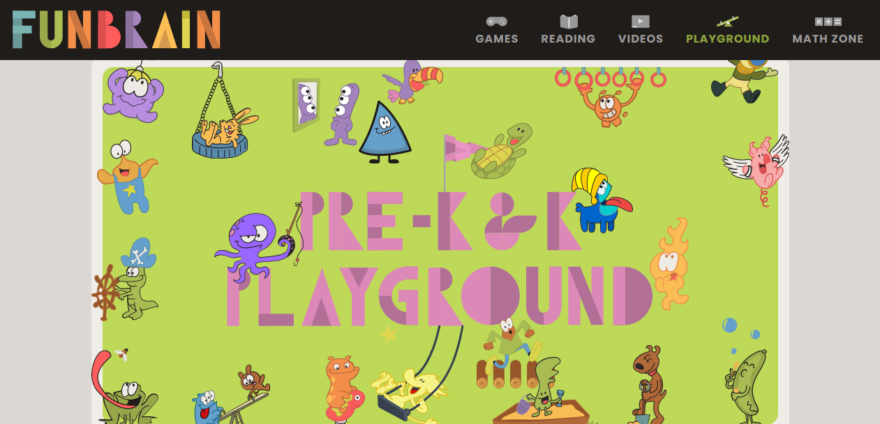
Launched way back in 1992 and best known as the Diary of a Wimpy Kid’s initial publication site, FunBrain is also home to the “Math Arcade,” a collection of games designed to make math problems accessible and fun.
Besides this, the site also hosts reading resources, videos, and other media, all of it sorted into different grades, making it easy to find the right material for your kids and keep them occupied for hours.
Cookie (Free)
Cookie is another general edutainment game website for children, with a selection of games introducing them to all the basic concepts they’ll encounter in school – science, maths, language, and so forth – in a fun and engaging way.
In addition, there’s also a selection of worksheets and coloring pages available on this website, making it an overall invaluable resource for parents and educators of very young children.
Nobel Prize Educational Games (Free)
Here’s one for the older (or just more talented) kids.
The Educational Games page on the official Nobel Prize website presents players with a great variety of simple games demonstrating complex concepts, all based on achievements that won the Nobel Prize.
There are games here that manage to make things like Pavlov’s Dog, blood typing and DNA seem simple and accessible. It’s an ideal spot to start introducing kids to the more complex things.
Quick, Draw! (Free)
In brief, Quick, Draw! gives your kids a prompt and ask to do a simple doodle of it. In doing so, they’ll teach Google’s AI to recognize images.
More importantly, though, in being asked to draw new things every time, they’ll develop their artistic creativity and talent as they experiment.
And along the way, they’ll have a few laughs at the AI’s wild attempts to guess what they could be doodling.
Knoword (Free & Paid Options)
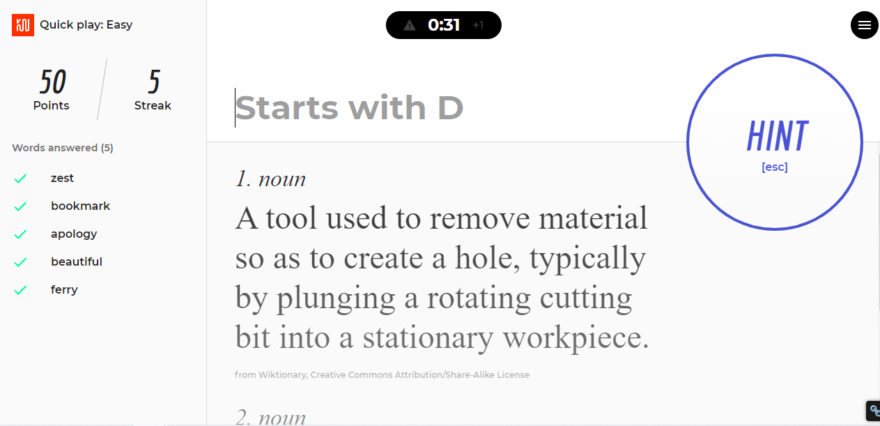
Another game centered on growing kids’ vocabulary, Knoword is a simple game of testing kids’ knowledge of definitions.
What gives this game its twist is that it includes an extensive number of community-made “word packs” that test kids on the meanings of words in various specific categories – everything from animals to astrology to food.
It’s an effective way to keep them engaged and teach them new words and new facts about a subject.
Mr Nussbaum (Free & Paid Options)
A wonderful testament to what a dedicated educator can create, especially when they embrace the internet as a learning platform, Mr Nussbaum is a website created by Greg Nussbaum, a fourth-grade teacher.
He is dedicated to providing his students and children over the world, with fun learning resources.
Like with ABCya!and Sheppard Software, the site’s games are handily sorted into different subject categories and are specifically designed to appeal to elementary school students.
Abcya! (Free & Paid Options)
Catering directly to schoolkids, ABCya!, in a similar vein to the JumpStart Games, handily sorts all of its games into specific grades and into various subject categories such as science and maths, languages, and art.
This makes it tremendously easy to figure out which games are right for your kids. These games work on tablets, too, so it’ll get them away from Candy Crush a while.
Turtle Diary (Free & Paid Options)
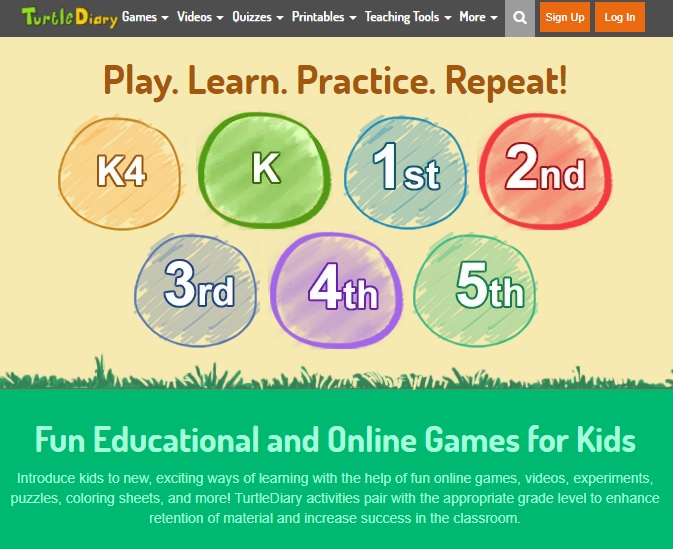
The layout of the site is a little ad-heavy, but still, Turtle Diary offers a handsome selection of educational games, many of them focusing on specialized things such as shape recognition, money value, and adjectives, making them especially useful for sharpening kids’ understanding of specific topics.
Moreover, the site also gives users access to automated assessment tests, easily allowing parents and teachers to analyze a kid’s strengths and weaknesses in various academic matters.
Starfall (Free & Paid Options)
Aimed specifically at grades Pre-K to 3, Starfall is generally a great site to introduce your kids to the internet through.
Aside from offering educational resources to parents and teachers of young children, the site also has a selection of browser games that introduce kids to the basic fundamentals of language and mathematics.
The interface of the games, and the site itself are colorful and simple, and the content is consistently kid-friendly.
Sheppard Software (Free & Paid Options)
Developed by Brad Sheppard, Sheppard Software is a site that offers educational games covering a wide variety of different subjects, from science and nutrition to geography and history.
All of these games are sorted neatly into different categories, and the site itself has a simple, monochrome design, making it easy on the eyes and simple to navigate for parents and children alike.
There are literally hundreds of games here, so expect hours of fun learning.
Kahoot! (Free & Paid Options)
Not only does Kahoot! provide users with countless quizzes on a wide variety of academic topics, but it also provides them with the means to easily craft their own.
As a result, Kahoot! is one of the most popular ways of turning classwork and learning into a game, since quizzes and games about any topic, suitable for any age group, are easily available at a mere few clicks.
Switchzoo (Free & Paid Options)
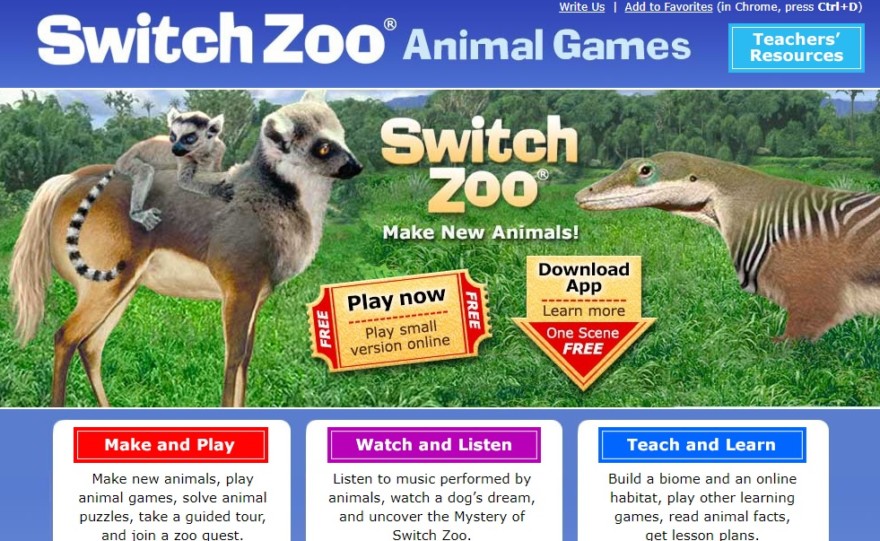
Most kids already tend to enjoy learning about animals, so turning it into a game can be a pretty easy affair.
Switch Zoo lets kids play various online browser games that teach them about the wonders of the natural world, helping them identify animal noises, learn the nature of different biomes, and even create their own creatures through a fun mix-and-match game.
It’s the sort of site where kids form that first love of zoology.
Dimensionu (Paid)
In our digitized age, esports has become almost as big as traditional sports; what DimensionU aims to do, in short, is to take what kids love about esports and multiplayer games, and combine it with learning about maths and literacy.
Fundamentally, DimensionU is a multiple choice quiz with game elements, but the game-like overlay and competitive elements ought to be enough to ensure that it’s more initially engaging to your kids than a traditional quiz.
Poptropica (Paid)
This one, admittedly, puts more emphasis on the “game” part of “educational game,” but it’s still something kids will enjoy and can learn from.
Essentially a browser-based MMO, Poptropica has players traveling between islands to solve quests.
Many of the islands have particular themes designed to educate players about a particular topic, and the game is specially designed to ensure that interactions between players are kept safe and kid-friendly.
Brainpop (Paid)
A site mostly aimed at educators, BrainPop, is home to educational curricula for kids aged 6 to 17.
Besides this, the site also hosts a great many games designed to educate kids on a wide variety of simple and advance topics, from language and social studies to science and technology.
If you’re a teacher, the chances are that, whatever your kids’ ages, there’s something here to help get them interested in a new subject.
Mobile Apps
Brainversity
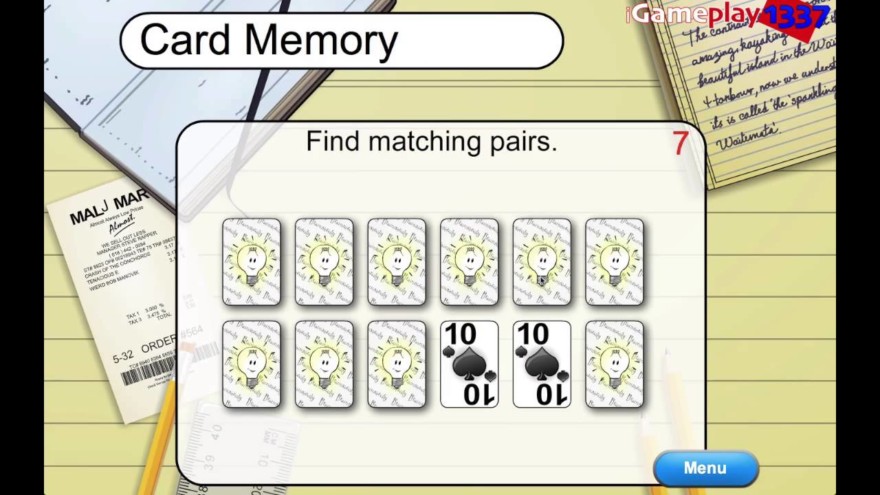
Brainversity is a simple but fun collection of 24 games for your iPhone, each one designed to test your skills in a category.
Kids can unscramble words to test your vocabulary, match cards to test their memory, or calculate bill tips to test their math skills.
They’re all the sort of games that are challenging, yet easy to get into, and thus just what a kid will go for when they pull out their phones.
Dragonbox
DragonBox, a company created by the Kahoot! group has created several apps designed to make relatively complex concepts simple and fun for young children.
Their Algebra games, for instance, present players with a picture card game in which each picture represents an algebraic symbol, and Elements introduces players to geometric shapes via a turn-based war game.
It’s an extremely resourceful use of traditional gaming mechanics that kids already enjoy to make learning fun.
Phonics Ninja
Learning proper spelling is critical for kids, but learning the proper sounds and pronunciations of letters is also tremendously important.
Phonics Ninja is all about getting kids to understand the relationship between sounds and letters, with the fun of phone slasher games like Fruit Ninja. Kids are presented with a sound and asked to “slash” the correct letter, or letters, that the sound corresponds to.
It’s ideal for a smartphone-loving kid who’s struggling with pronunciation.
Monkey Word School Adventures
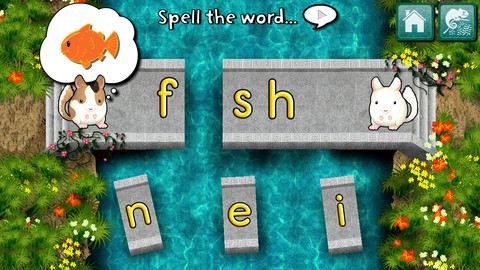
Kids can never start learning to read too early. Monkey Word School Adventures, aimed at children 4 to 7, is designed for very early readers, presenting them with a series of simple challenges that help familiarise them with basic letter recognition, spelling, and phonics.
The app’s challenges are slick and pass by quickly, ensuring that children remain engaged throughout and be exposed to a variety of reading-related skills quickly.
Droplets
The kid-friendly version of Drops, a language app for adults, Droplets takes a very visual, game-based approach to introducing kids aged 7 and up to new languages – an invaluable skill in our increasingly globalized world.
Through a combination of text, audio, and images, the app helps kids build a new vocabulary by focusing on words of interest to their age range, and directly associating words with particular images.
Creature Garden
For kids with interest in the wonderful world of animals, Creature Gardenis an ideal opportunity to learn about the basic anatomy of different creatures while also having fun playing a benevolent Dr. Moreau.
This simple app lets kids create their own creatures out of the body parts of different animals and test out their swim, walk or fly, thus both testing their creativity and teaching them the basics of animal mechanics and locomotion.
Duolingo
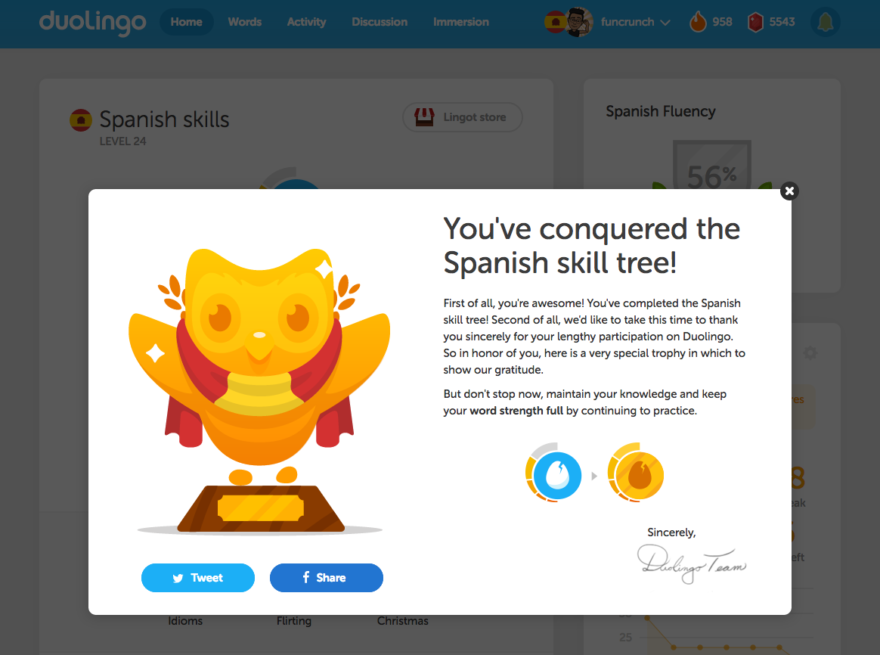
You’ve likely heard of this one – there’s a reason Duolingo is one of the leading names in language apps right now.
The app is suited to users of many ages, but the simple interface, colorful imagery, and game-like lessons and quizzes make it highly accessible to children.
Aimed at developing speaking skills as well as reading comprehension, this makes for a great starting point when introducing kids to a new language.
Thinkrolls
Platformers have been a classic gaming genre since the early 90s, and are still tremendously popular today. Thinkrolls takes advantage of the strategic elements of platformers to teach kids the nuances of logical thinking.
Kids are presented with 207 different puzzles and are required to use the physics of the game’s various objects to logically think up a solution to each one. It’s a tremendously fun way to encourage kids to think logically.
Mathtango
Mathtango demonstrates how much easier it can be for kids to learn dull things like mathematics when they receive tangible rewards for it.
The app presents users with hundreds of puzzles covering basic maths skills, as well as lesson reinforcement tests.
Successfully completing puzzles earns players new monsters and items to add to their island, thus giving them the incentive to keep completing puzzles as they build their unique world.
Spelling Stage
Focused, as the name implies, on spelling, Spelling Stage presents kids from ages 4 and up with challenges designed to improve players’ spelling. The game contains hundreds of words sorted into preloaded lists to test players on.
There’s also a hint system, and competitive kids can up the ante by playing against friends.
This is all presented in a charmingly minimalist art style that’s bound to resonate with young players.
The Earth
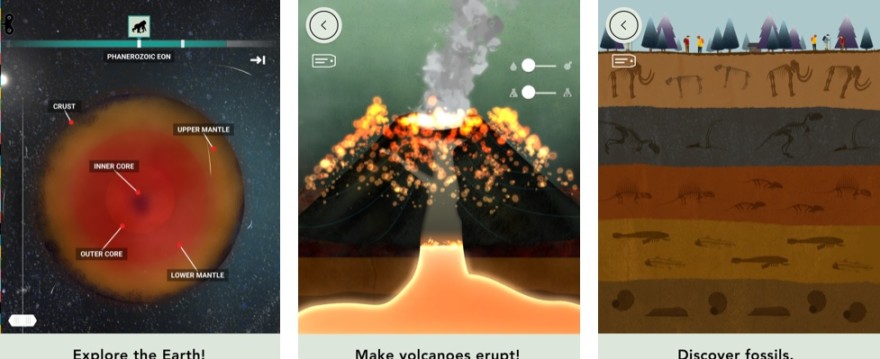
The Earth is a planet we all have to share, and it’s important to ensure that kids learn about it early. Tinybop’s The Earth app makes for a great starting point for teaching them geological matters.
This app simulates the shaping of our planet and allows kids to carve out rivers, erode away mountains, and make volcanos erupt, all with a touch of their fingertips.
These unintimidating games make for a great first introduction to how our planet was formed.
Ocean Forests
Aimed at kids from kindergarten to 3rd grade age, Ocean Forests is a charming app that teaches your kids all about the fascinating world of ocean forests.
Kids can play ocean-themed games to test their reading skills and expand their vocabulary, or simply explore an open 3D ocean environment.
It’s not often that an app can allow kids to simultaneously have fun, improve their reading, and learn about the ocean all at once.
Hopscotch – Programming for Kids
Ours is an increasingly digitized society, and the chances are that many of our kids are going to go into computer programming. Apps like Hopscotch are invaluable for giving kids a head start in programming early in life.
The app allows kids to learn the basic elements of programming through drag-and-drop games that allow them to create their own programs and animations and share them with other young programmers. It’s very much an app for the ambitious modern kid.
Stack the States
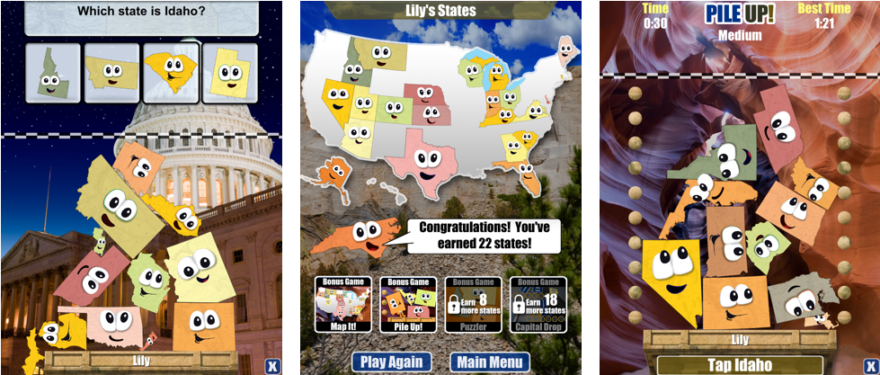
If your child is having trouble learning US geography, Stack the States is the ideal app to get them on.
The app offers various simple games and puzzles – a puzzler, a stacker, a matching game, and whatnot – all of which center on learning which US state is which, what their capitals and flags are, and other basic geographical facts.
It’s a fun and simple introduction to the complex geography of the United States.
Marvel Hero Tales
Marvel superheroes are all the rage with folks of all ages lately, and Kuato Studios have taken advantage of this with Marvel Hero Tales.
This allows kids to fight evil in the shoes of their favorite Marvel character, while also stealthily improving their language ability since combat is centered on matching words to their meaning.
It’s not often a kid who gets to forge their own superhero legacy and build up their language at the same time.
The Robot Factory
Almost every kid, at some point, dreams of building robots. Tinybop’s The Robot Factory has created an app that simulates this dream while also introducing kids to the basics of robot building.
With this app’s simple interface, kids can learn about the basic construction of robots as they design their own model from over 100 parts and witness robot physics as they take their personal robot for a test run or make them dance.
Lightbot
Another ideal app for kids with interest in programming, Lightbot allows the youngest kids – even total newcomers – to develop an understanding of such concepts as loops and procedures.
This is all communicated by way of a simple and unintimidating game centered around guiding a small robot over a number of tiles.
It’s the sort of app that really demonstrates that even the most complex concepts can be introduced in a simple manner.
PC & Console Games
Minecraft: Education Edition
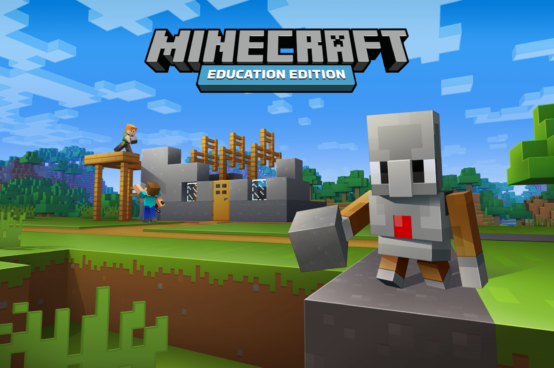
Platform: PC
Microsoft is clearly aware of how much kids love the open-world game Minecraft because they’ve created a version of it that makes use of the game’s extremely versatile nature to educate young players.
Users can download a whole host of individually crafted lessons on everything from maths to history to visual arts, and present them to children by way of a game that they already associate with fun and excitement.
Epistory – Typing Chronicles
Platform: PC
Many parents overlook how important it is to teach kids typing skills. After all, the world is increasingly digitized, and the chances are that your kids are going to grow up doing almost all of their written work on a keyboard.
Epistory takes the unique approach of making typing challenges feel genuinely epic by presenting them via a narrative of a young girl riding a three-tailed fox through a world of origami.
Oregon Trail
Platform: PC
Admittedly, this one is only useful if you happen to be teaching the kids the history of the American pioneers; but if you are, it’s absolutely invaluable.
It may be one of the first educational games ever made, but it’s now widely regarded among educators and retro gamers alike for its combination of deeply challenging gameplay and engaging way of conveying facts about the pioneering life.
Crazy Machines
Platform: PC
A modernized spiritual successor to The Incredible Machine on DOS, this game is centered on the notion of making mechanical matters seem accessible to children – kind of like an interactive simulator of Rube Goldberg machines.
Through a simple interface, players can use gears, levers, and cranks to craft their own machines, providing them with a fun and interactive overview of how various machine parts work and interact.
Portal
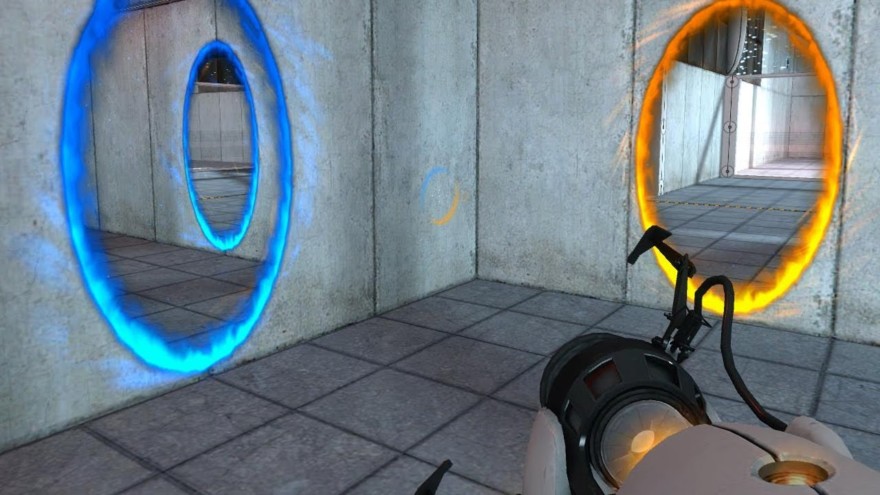
Platform: PC
Besides the mystery-infused story and witty dialogue that made it memetic, Portal also stands out as a game with puzzle elements engaging and challenging enough to make it engaging to players of all ages.
The player is given one tool – a gun that shoots two portals that connect together – and is required to use it to navigate various increasingly elaborate obstacle courses.
It’s a wonderfully fun way to develop a child’s logical thinking.
Itzabitza
Platform: PC
Games like ItzaBitza are what prove that modern technology, despite the distractions it causes, really can be used to foster creativity in children.
Its drawing recognition system brings to life whatever kids choose to draw, playing out a scene with their creation at the center.
It’s an ingenious way of encouraging experimentation and providing immediate rewards for creativity, while prompts and challenges help develop early reading skills.
Crayon Physics Deluxe
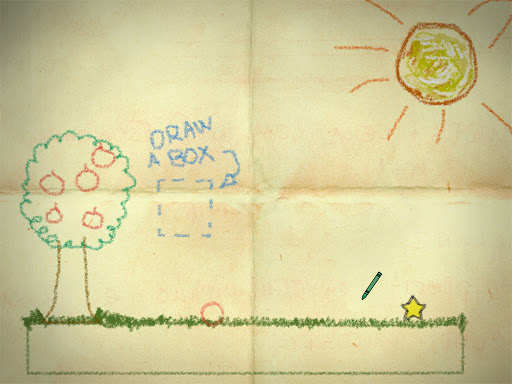
Platform: PC
In a similar vein to ItzaBitza, Crayon Physics Deluxe centers on formulating a love of drawing in kids by bringing their creations to life.
The game’s realistic physics engine causes drawn objects to interact with each other, and kids can make use of this to solve puzzles and get stars.
Besides encouraging kids to draw, it’s also a great introduction to the basic concept of physics and how solid objects interact with each other.
Zoombinis
Platform: PC
Initially created in the 90s and recently remade, Zoombinis might be considered a less sadistic version of Lemmings.
As they guide the Zoombinis home, kids will be presented with a series of puzzles that will encourage them to utilize logical thinking and be resourceful.
Combine this with the bright, cartoony art style and diverse variety of backdrops, and this is a game that’ll keep them both amused while sharpening their minds.
Carmen Sandiego
Platform: PC
Perhaps the most iconic name in educational gaming, the Carmen Sandiego series, taught kids all about geography while giving them the sense of being a crime-fighting detective.
While it may have started in the 80s, with a new Netflix series starring the character and a series of browser games compatible with Google Earth, it’s clear that this isn’t a series that’s going to languish in the age of DOS.
Magic School Bus
Platform: PC
This, much like Carmen Sandiego, is a series that’ll be fondly remembered by 80s and 90s kids, but which hasn’t lost a bit of its educational value over the years – these simple point-and-click games still offer a simple, interactive, visually engaging to convey facts about the world to children.
Pair this with the new Netflix animated reboot, and your kids will form the same fond memories of lessons with Ms. Frizzle that you have.
Jumpstart
Platform: PC
Yet another edutainment game franchise from the 90s, the JumpStart games made the handy choice of specially designing each game in the series to cater to a particular grade’s curriculum, with a game for each school year from kindergarten to 6th grade.
The games present players with a variety of activities and challenges that cover more or less every subject they’re likely to encounter at school, making a great complement to the grade school experience.
Reader Rabbit
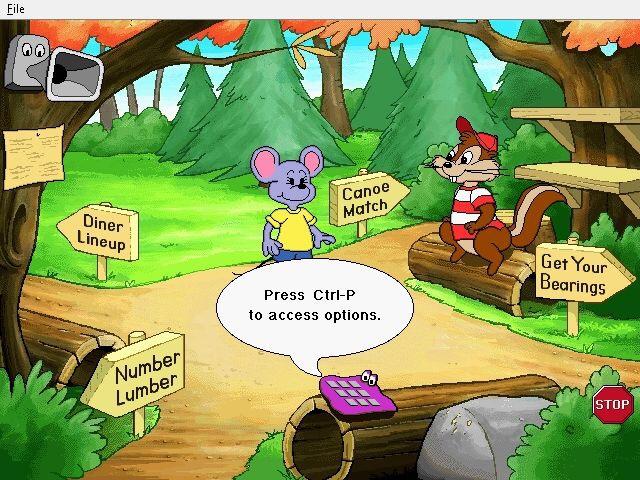
Platform: PC
Despite the name, the Reader Rabbit series doesn’t just cover literacy; the various games in this extensive franchise introduced kids to a great variety of basic subjects.
In a similar vein to JumpStart, Reader Rabbit takes the handy approach of ensuring that each game caters to a specific school year and covers such topics as literacy, maths, and shape recognition, all communicated by a host of cheery cartoon mascots.
Living Books
Platform: PC
Fostering literacy in children is crucial to their early development. Even years after their release, the Living Books series, while minimal in gameplay terms, lends a level of digital interactivity to reading a book that resonates tremendously with modern children.
Featuring books from multiple noted children’s book series, including Arthur and The Berenstain Bears, the games guide the kids through the text while giving them plenty of amusing animations to click on.
Super Solvers
Platform: PC
The 90s really were the heyday of educational PC games, and many of them, like the Super Solvers series, are freely available as abandonware nowadays.
This particular series puts kids in the shoes of a super-sleuth going up against a mad scientist and uses this engaging premise to present them with puzzles and challenges.
Each game follows a theme – be it science, history, maths, or reading – and centers its challenges around that subject.
Nancy Drew
Platform: PC
For well over a century now, super-sleuth detectives have been tremendously popular as characters – there’s a reason they’re still making Sherlock Holmes movies, after all.
The Nancy Drew adventure games, like the book series they’re based on, introduce kids to the super-sleuth character early.
However, through the challenging-yet-accessible puzzles they present, they also help kids develop their logical thinking, and put them on the path to developing their own super-sleuthing skills.
National Geographic Challenge!
Platform: PS3, Xbox 360, Wii
National Geographic has been making facts about the world accessible to both kids and adults for decades now, so it’s only natural that they’d branch out into video games.
This one, available on several major consoles, pits players against each other as they answer questions about history, biology, and geography.
It’s a great way to teach the kids new facts while having all the fun of an especially engaging family game night.
My Word Coach
Platform: DS
Fostering an extensive vocabulary in kids is something any parent can agree is essential if children are to express themselves properly.
As the name implies, my Word Coach intends to coach children in growing their vocabulary through a variety of exercises centered on spelling and defining words.
The game adapts to the player’s vocabulary level, presenting an encouraging and engaging experience for children without ever feeling frustrated or discouraging.
Big Brain Academy
Platform: DS
A more general sort of edutainment game aimed at slightly older kids, Big Brain Academy, presents players with questions in diverse categories, such as mathematics, memory, and logic.
Variety, needless to say, is invaluable in training children since it exposes them to different concepts and helps ensure that they don’t grow bored from repetition. This is all done through a slick interface and a charmingly minimalistic art style.
Metamorphabet
Platform: PC
Ideal for children newly learning the alphabet, Metamorphabet was created by Patrick Smith, a developer noted for his surreal and distinctive art style.
The game displays each letter of the alphabet one after the other, and clicking on them causes them to transform into things that that letter stands for.
The D turns into a door, the N grows a nose, and so forth. It’s simple, but tremendous fun, and great for learning letter association.
Scribblenauts
Platform: DS
Most kids dream of being able to summon any object they want simply by wishing for it; Scribblenauts brings this to life, allowing you to summon any object by writing its name.
Kids are then challenged to use this ability to figure their way out of a variety of puzzles and challenges.
The game is this tremendously effective at developing kids’ logical thinking, allowing them to think outside the box in a way few other games do.
Smarty Pants
Platform: Wii
Family trivia nights are an age-old tradition, but modern kids are more likely to participate if they’re done through a console.
Smarty Pants allows players to face off in a trivia battle, with each players’ questions based upon their age, ensuring that everyone gets an equal shot.
The questions cover everything from arts and fashion to science and sports and are an opportunity for everyone in the family to grow their knowledge.
Final Thoughts
There are, in short, countless games out there on multiple platforms that present kids with the opportunity to learn while having fun.
Digital platforms are a major part of kids’ lives nowadays, and as parents and educators, we need to adapt to this as we ensure that our kids are given the education that they need.
